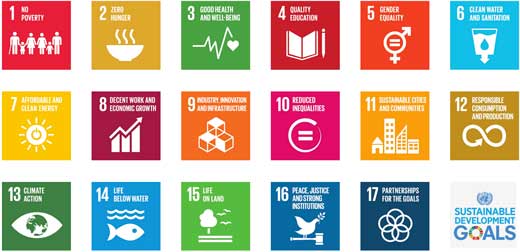| Dec 01, 2017 |
Consumption is the bottleneck for sustainable development
|
|
(Nanowerk News) From ending poverty to improving wellbeing, gender equality, cities' resilience or climate action - while synergies among most of the United Nations Sustainable Development Goals (SDGs) foster progress in sustainable development, there are some key conflicts or bottlenecks that could hamper achieving the SDG objectives for 2030. This is the result of a new comprehensive analysis by a team of scientists from the Potsdam Institute for Climate Impact Research (PIK). According to the study ("A Systematic Study of Sustainable Development Goal (SDG) Interactions"), responsible consumption and production seems to be such a bottleneck, as data from the past shows.
|
 |
| The 17 Sustainable Development Goals (SDGs). (click on image to enlarge)
|
|
“The Sustainable Development Goals aim at tackling complex multi-dimensional challenges faced by humankind and set the international agenda for 2030. However, so far little is known about the interactions, correlations and potential conflicts between the set of SDGs,” explains lead author Prajal Pradhan. “We tried to break up the complicated interlinkages into more comprehensible pairs so we could investigate how different SDGs influence each other. It turns out that in general, synergies outweigh trade-offs for most SDGs and countries. However, one SDG stands out as being in partial conflict with a number of other goals - that is responsible consumption and production.”
|
|
Improvements in well-being, economic prosperity, and lifestyles currently still come to a large extent through an increase in consumption and therefore with the growing environmental and material footprints. To successfully implement the 2030 development agenda, such conflicts in objectives need to be identified, governed and tackled.
|
|
Adopted in 2015, the Sustainable Development Goals comprise 17 goals and 169 targets, ranging from human well-being to economic prosperity and environmental protection. The UN objectives to transform the world until 2030 are also the frame that member states are expected to adopt for their agendas and policies for development and sustainability. Identifying synergies and tradeoffs through SDG interactions is central to the design of feasible policies. So far, SDG interactions have mostly been analysed qualitatively, for few targets or for individual regions of the world.
|
Lessons from the past: Data reveals more synergies than trade-offs
|
|
“Our study provides the first complete quantification of synergies and trade-offs as they can be detected in data from the past to the present within and across the SDGs, both at country level and on a global scale,” says co-author Jürgen Kropp, vice chair of PIK’s research domain Climate Impacts & Vulnerabilities.
|
|
Using a statistical setup applying data from the UN Statistics Division on 122 indicators for more than 200 countries between 1983 and 2016, “we were able to carve out the lessons to be learned from historical data. This is a simple but highly useful approach, as the SDGs may be still new, but the challenges are certainly not,” he adds.
|
|
The results not only reveal possible conflicts between the SDG goals, they also highlight a huge potential for synergies when it comes to the fight against poverty, hunger and for health and well-being. Eliminating poverty and improving public health positively influenced most other SDGs.
|
|
For instance, around three billion people around the globe live in countries where improvements on health and well-being matched with the provision of clean water and sanitation. Identifying the countries where synergies occur allows for being able to learn from the best practices.
|
|
As another example, countries associated with sustainable cities also seem to score well on climate action – which again indicates a strong potential for synergy. Based on the study results more elaborated concepts can be developed in order to make reliable projections about future fulfillments of SDGs and associated consequences.
|
|
“The SDGs represent a holistic and multi-dimensional perspective on development,” says co-author Wolfgang Lucht, chair of PIK’s research domain Earth System Analysis. “The empirical framework on the evaluation of SDG interactions here presented makes a fundamental contribution to ensuring successful policy implementation of the SDG agenda. Attainment of SDGs is central for the great transformation that is required for overcoming the unsustainable practices visible in the historical data. To achieve this, the SDGs need to act as a system of interacting components that together move the world into a safe and just operating space. Our study shows that the SDGs are much more than just a collection of targets, but a system of synergistic re-enforcement. While no single SDG has the power to transform the world alone, the whole set of SDGs together does.”
|

